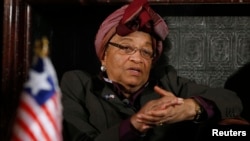Leaders from the three West African countries hardest hit by Ebola are calling for more international aid to help them emerge from the devastating outbreak.
Liberian President Ellen Johnson Sirleaf called for a massive financial response to Ebola, similar to the U.S. Marshall Plan that helped rebuild European economies after World War Two, during an international conference in Brussels Tuesday.
"We need our international partners to remain committed to us on this journey, as we build our resilience to manage any possible future outbreaks of the virus," Sirleaf said at a conference hosted by the European Union.
"Just as importantly, we need to respond to the economic impact of the disease, to stabilize our economies, to return to the path of inclusive growth on which we had embarked before the virus hit," she added.
$5 billion in international aid
The international community has pledged nearly $5 billion to fight Ebola. Roughly half of that has been disbursed.
The International Monetary Fund and the World Bank will host another conference in April to assess whether more financing is need to tackle the outbreak.
Sirleaf was joined in Brussels by the leaders of the two other Ebola devastated countries in West Africa -- Ernest Bai Koroma of Sierra Leone and Alpha Conde of Guinea.
Nearly 10,000 people have died in the Ebola outbreak, the vast majority of them in the three countries. U.N. experts said Ebola's spread has dropped by 10 percent since six months ago.
Last week, the World Health Organization reported 99 confirmed new cases in the three countries, two thirds of them in Sierra Leone, but only two cases in Liberia.
With the drop in Ebola infections in Liberia, the government recently resumed schooling, lifted a curfew and opened borders to neighboring countries Guinea and Sierra Leone, where the Ebola epidemic is far from being over.
Some Liberians fear that step might have come too early, considering neighboring Sierra Leon's Vice President Samuel Sam-Sumana put himself under quarantine after one his bodyguards died from the virus last week.
Sierra Leone's President Koroma warned against complacency and called for donors to respond the countries' recoveries. The outbreak has devastated the economies of all three countries.
"We have to respond to the many ways this disease has made the countries vulnerable. We need to deliver social services more effectively than we have ever before. And we must do so urgently," Koroma said.
Liberian Deputy Minister of Public Affairs Isaac Jackson said he had received several phone calls from concerned Liberians.
“They were alarmed by that and then were asking all the questions. How come with that kind of situation in Sierra Leone, why are we opening our borders. ... And I smiled because I know for a fact that we had similar situations like that before," Jackson said.
Opening borders a risk
Harris Demell, 27, a day laborer in Monrovia, said last year’s crisis was too severe to now risk it coming back.
“For me, I think they should give it at least about three to four months more to assess the other people before they can open the borders," Demell said.
"But opening the schools is [another thing,] because the borders, people are coming in and going out, it sounds like too early for us. Because we are still here, we are seeing Ebola cases coming again. Ebola is not just a virus that can just leave [the] area so fast. It [takes] a long time to go," he added.
Sociology student Rachel Jallah agreed, and said despite schools and universities being reopened, she stays at home in Monrovia because she is still scared of the virus.
“Opening the borders, you do not know whether the virus will come or occur again. So I really do not deem it necessary for the borders to be open," Jallah said.




